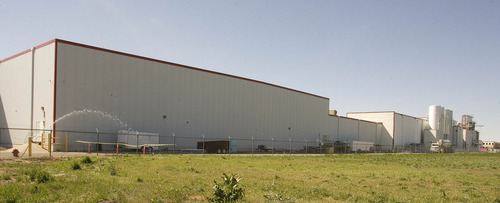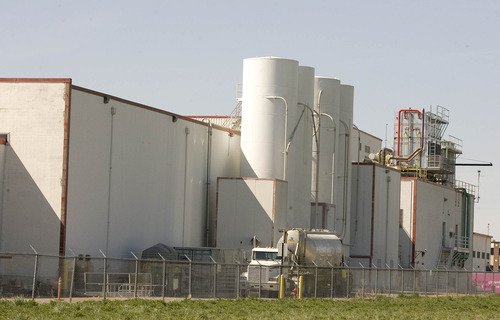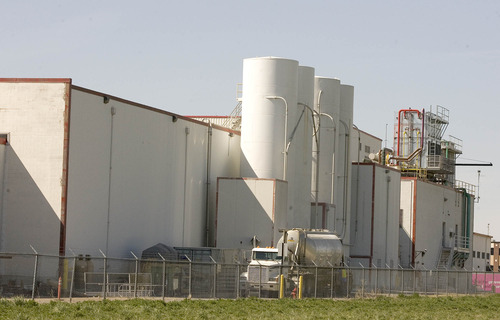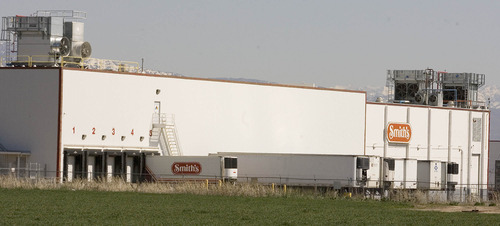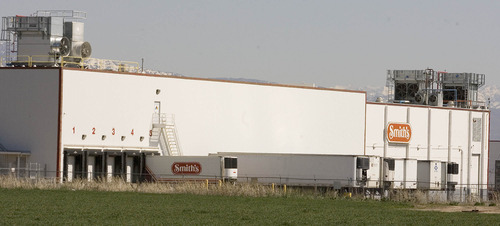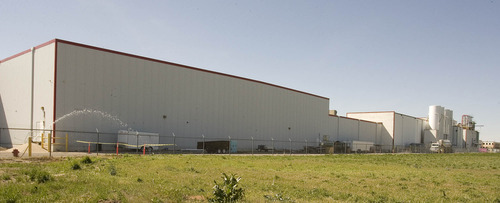This is an archived article that was published on sltrib.com in 2013, and information in the article may be outdated. It is provided only for personal research purposes and may not be reprinted.
Layton• The state of Utah urges residents to "Slow the Flow," but residents aren't the biggest water consumers in Davis County.
Businesses in Davis County are using the most water, according to data from cities across the county. And the greatest water user is the Smith's Food and Drug Layton Distribution Center in Layton. It uses nearly 16.5 million gallons per month.
By comparison, the 2009 Residential Water Use survey conducted by the Utah Department of Natural Resources found Utah residents averaged about 9,600 gallons of water per month.
Marsha Gilford, vice president of public affairs for Smith's, said the water is necessary to manufacture ice cream, yogurt and other dairy products for stores throughout the West.
"We receive thousands of gallons of raw milk that is transported to other containers and pasteurized. It is then bottled there," Gilford said. "Dairy trucks pull into those facilities and the entire area is sterilized regularly."
Smith's parent company is the Kroger Co. According to a 2012 Sustainability Report, the Layton Distribution Center is using 8 percent less water than in 2011.
"In the food manufacturing business, a lot of water is required," Gilford said.
Other big water consumers in Davis County are:
• Layton City, which averages 1.8 million gallons a month to water Ellison Park.
• Quick and Clean Car Wash in Clinton, which uses 331,000 gallons a month.
• Grease Monkey in Clinton, a car repair and maintenance shop, uses 249,000 gallons a month.
• Maverick gas station in Syracuse uses 240,000 gallons a month.
• Top Stop gas station in Centerville uses 193,000 gallons a month.
All across the county, businesses tend to pour and spray more water than homes.
In a 2012 Bountiful water consumption report, the city said non-resident users averaged 56,000 gallons a month. Bountiful residents only averaged 11,000 gallons a month.
Weber Basin Water Conservancy District, which supplies water to Davis County, is allotted a certain number of water rights. If those are consumed, it will be costly to develop the next source, according to Brad Nelson, the municipal and industrial water manager for Weber Basin Water.
And that next source could be Willard Bay, 22 miles and two counties north of Davis County.
"We aren't treating Willard Bay right now, but if we have to start treating Willard Bay, our costs are probably going to double" due to infrastructure and treatment costs, Nelson said.
The current Weber Basin Water rate for treated water is $350 an acre-foot, which is roughly 326,000 gallons. Imagine a football field with a foot of water covering it.
Currently, Weber Basin has seven reservoirs storing more than 123.5 billion gallons of water.
Willard Bay is the largest of these reservoirs, storing about 64.6 billion gallons. By comparison, the Great Salt Lake has 5 trillion gallons of water.
If residents and businesses keep consuming water, Willard Bay might not be enough.
"When that supply is gone [Willard Bay] then we are looking at the Bear River," Nelson said. "Right now, just to build a reservoir to store that Bear River water, we're looking at over a billion dollars."
The question then is, how much water should residents conserve?
"It's a double-edged sword," Brett Egget, the production supervisor for Bountiful City Water Department said. "The more water we conserve, the less water we sell, so we have less revenue to take care of the infrastructure."
However, Egget added, "It's always a good idea to conserve."
Nelson calls the Weber Basin Water "high quality."
"We're trying to get people to use less water so we can make what we have last longer," he said.
Twitter: @sltribDavis


